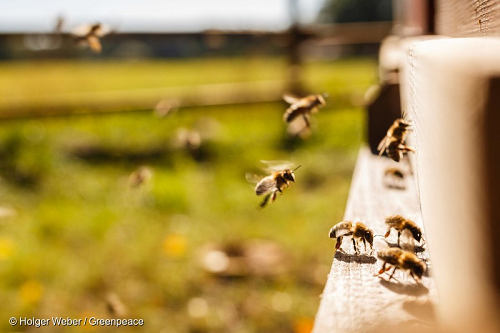EU court: protecting people and nature takes precedence over business interests
Bayer and Syngenta lose court cases against 2013 partial neonicotinoid ban
The General Court of the European Union has ruled that the European Commission was right to impose restrictions on the use of three bee-killing neonicotinoid pesticides – imidacloprid, clothianidin and thiamethoxam.

The court upheld the 2013 restrictions on the three pesticides, rejecting two separate legal challenges by Bayer and Syngenta, makers of imidacloprid and clothianidin, and thiamethoxam respectively. In its press statement, the court asserted that the European Union’s precautionary principle “gives precedence to the requirements relating to the protection of public health, safety and the environment over economic interests.”
Greenpeace intervened in the Bayer and Syngenta cases to provide evidence and legal arguments in support of the restrictions.
Greenpeace EU food policy adviser Franziska Achterberg said: “The ruling sets the EU’s priorities straight – its primary duty is to protect people and nature, not company profit margins. It’s an indictment against corporate bullying that should spur the Commission to act on other dangerous pesticides without fear of being challenged in court.”
Research indicates that several other pesticides are a threat to bees and other beneficial insects, including four neonicotinoids currently authorised in the EU – acetamiprid, thiacloprid, sulfoxaflor and flupyradifurone – and other insecticides, like cypermethrin, deltamethrin and chlorpyrifos.
Failure to address the wider chemical burden on bees could mean that farmers simply replace banned chemicals with other permitted chemicals that may be just as harmful, warned Greenpeace. To avoid this, the EU must:
● ban all neonicotinoids, as France is considering;
● apply the same strict testing standards to all pesticides;
● dramatically reduce the use of synthetic pesticides and support the transition to ecological methods of pest control.
The pesticide producers are expected to appeal the ruling.
Source: Greenpeace European Unit
- 299 reads
Human Rights
Fostering a More Humane World: The 28th Eurasian Economic Summi

Conscience, Hope, and Action: Keys to Global Peace and Sustainability

Ringing FOWPAL’s Peace Bell for the World:Nobel Peace Prize Laureates’ Visions and Actions

Protecting the World’s Cultural Diversity for a Sustainable Future

Puppet Show I International Friendship Day 2020

